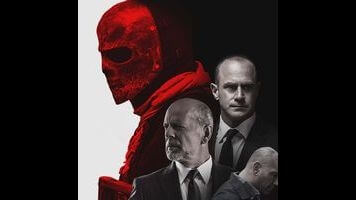Even Bruce Willis looks lost in confused crime thriller Marauders

Marauders is like a sophomoric college essay: It’s full of interesting ideas that get bungled in the execution. Interspersed with some well-done robbery set pieces, the film as a whole strives for unearned depth, dropping an entire thesis about the nature of legality and ethics into a straightforward crime flick, thereby making the latter elements needlessly confusing while the former get watered down into lackadaisical platitudes. Attempting the profound when you’re out of your depth is the definition of pretentious, and Marauders succumbs to this temptation.
When the characters in your heist film call out the plot for being unnecessarily complicated (with not a hint of winking at the screen), the lampshade you’re hanging is too big to sustain believability. In this case, that means the gang of masked robbers carrying out military-precision hits on Cincinnati banks, a case that lands on the desk of FBI special agent Jonathan Montgomery (Christopher Meloni), who directs his team—including bruiser agent Stockwell (Dave Bautista) and fresh-out-of-Quantico agent Wells (Adrian Grenier)—to start sussing out the the strange goings-on in these seemingly straightforward cash grabs. It soon becomes clear there’s a personal vendetta being carried out under the veneer of the bank jobs, and it’s directed at the CEO of all the branches, one Mr. Hubert (Bruce Willis), introduced delivering a monologue about Wall Street’s douchebag mentality that essentially says, “I’m a villain, and the mustache I’d normally twirl right about now is probably in the shop.”
The rationale behind the crime spree turns out to be weirdly convoluted, just like most aspects of this thriller, and that messiness prevents it from achieving the simple pleasures of the better genre flick it could’ve been. Most great B movies have good ideas at their foundations but know better than to try and spin them out into webs of extra convolutions and narrative dead-ends. Marauders mistakes structural complications for thematic ones, and that desire to render literal the thorny knots of bureaucratic versus moral obligations proves too much for it to handle. There’s a crooked cop (Johnathon Schaech) who just so happens to have a wife dying of cancer, a subplot we spend a good amount of time on despite getting almost no insight into his character. Meloni’s widowed agent is one of those only-in-the-movies depressed cops who has cinematic tics like ordering wine but never drinking it and sitting in the middle of his couch amid a largely unfurnished room while listening to Beethoven on vinyl. As his team delivers large exposition dumps, and characters we don’t see until the final act become the pivot points around which everything rotates, the whole endeavor feels muddied by confusion. Even Willis, who normally would cash his check and amble along genially, is stranded in his minor role by the material.
What makes it watchable despite all the narrative hemming and hawing are the robberies themselves, which are vital and potent thanks to some inventive choices in execution. Director Steven C. Miller (who also helmed the far more entertaining The Aggression Scale) makes some inexplicable decisions when it comes to stylistic devices (Meloni’s cop is introduced via a slo-mo walk for no reason), but he handles the action choreography and violent encounters with respectable flair. Bautista again makes a lunkheaded heavy more appealing than such a character has any right to be, and Schaech’s haunted eyes lend pathos to his cop that the screenplay never earns.
Marauders wants us to ask difficult questions about the value of staying within the confines of the law, and to its credit, it does so by explicitly rejecting the reactionary Dirty Harry ideology that drives so many cops-vs.-robbers stories. Rather than endorsing the fast-and-loose “fuck the law” attitude of heroes we’re meant to laud for their internal moral compass, the film suggests such ethical compromises end up doing more harm than good. Even better, it ultimately leaves judgment in the hands of the viewer, refusing to grant either legitimacy or condemnation to well-intentioned criminality. If only Marauders didn’t have such difficulty wrangling its own contradictory intentions.